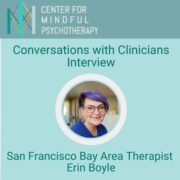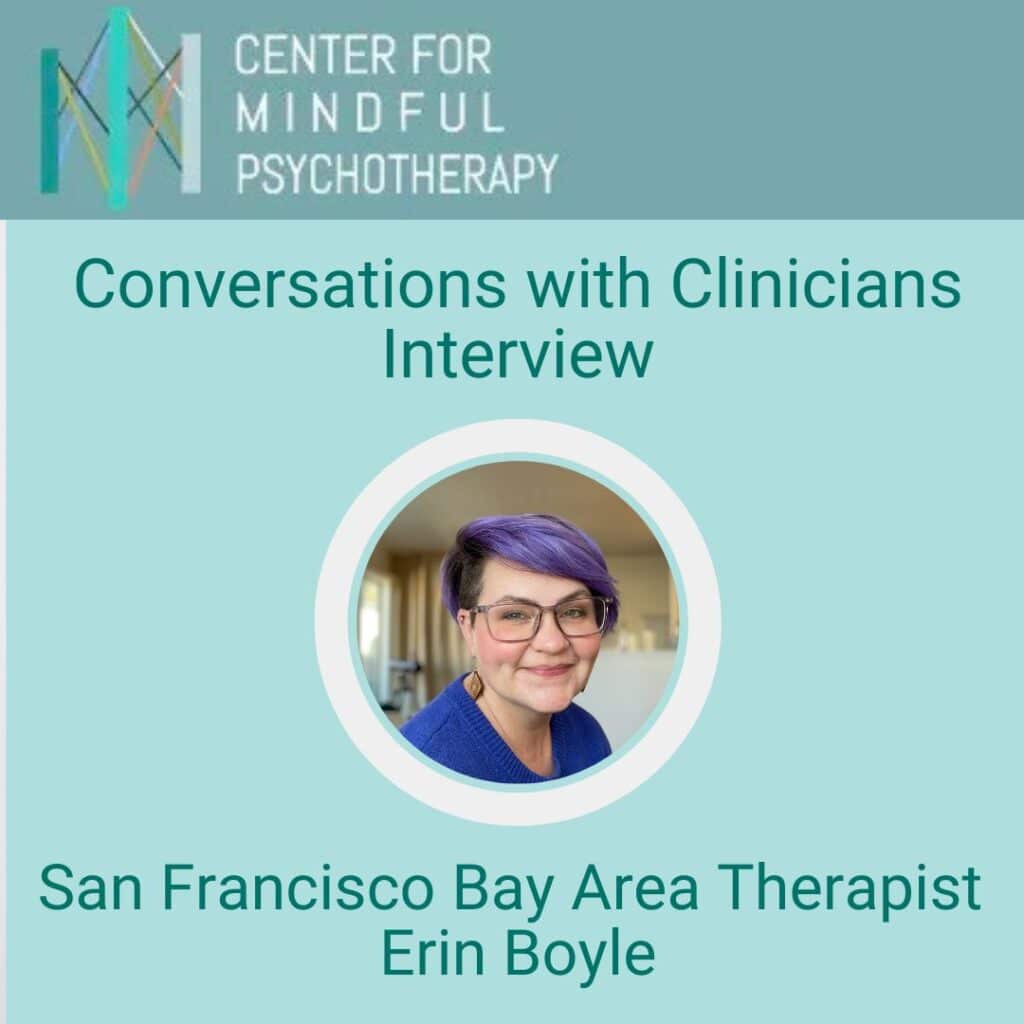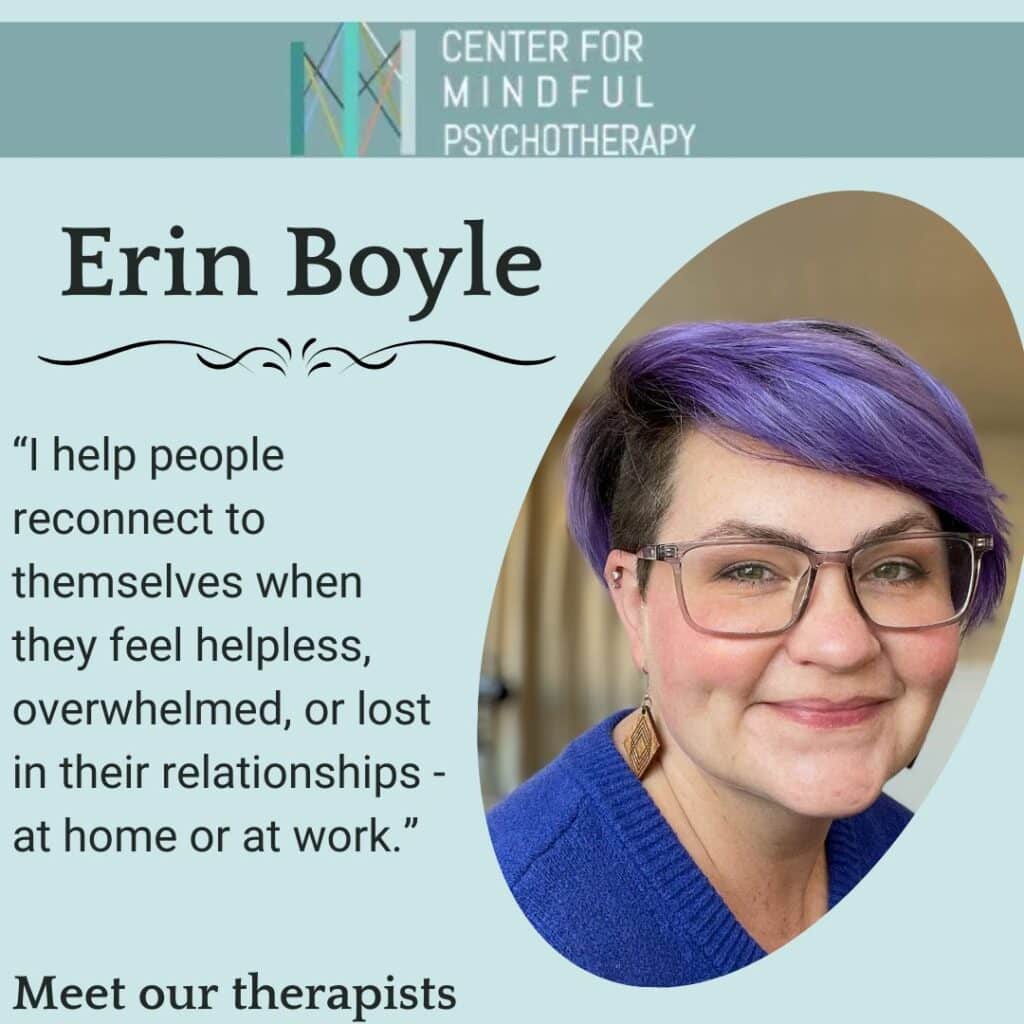

Welcome back to Conversations with Clinicians where we interview one of our associate therapists. We like to give you this opportunity to learn more about the way that they work. It can also give you insight into therapeutic modalities, approaches and techniques. Today, meet California telehealth associate therapist Erin Boyle, “a trauma-informed relational therapist who pulls from somatic, psychodynamic, and gestalt modalities.”
What are your areas of specialty?
For adults, I specialize in working with relational trauma, which often manifests as depression or anxiety. I particularly enjoy working with high-performing adults who are struggling with depression, burnout, and difficult relationships at work or home, especially folks who work in tech and hold underrepresented identities.
I also really love working with teens just starting out in high school who are struggling with confidence, feeling “dumb,” or simply the everyday pressures of being a teen in our society.
What other modalities inform your work?
I pull from all sorts of life experience I have, including:
- Playing classical piano (music, rhythm, and its relationship to our nervous systems)
- Powerlifting (body positioning and confidence)
- Coding and related nerdery (a systems lens of relational dynamics)
- Writing and presenting (the power of metaphor to say more than we otherwise can)
What is it like to work with you?
I have been described by friends as warm, caring, and wholesome, with a “cozy vibe.” I am easily moved yet also quick to laugh, which means therapy with me can feel slow and gentle or vibrant and alive, depending on what’s happening at any given moment.
Who do you LOVE working with?
I love working with deep-feelers in technical and/or leadership-adjacent roles. Oftentimes these folks have a lot of passion and big feelings while working in and navigating really cognitive or goal-oriented settings. These people tend to be really accomplished (perhaps overachievers), yet can sometimes feel really demoralized, undervalued, and lost in these environments.
What most inspires you about doing this work?
I am constantly amazed at humans, and how quickly and brilliantly we adapt to and cope with truly awful circumstances. I marvel at what my clients have overcome in the past and continue to overcome today. I am inspired by both the resilience of my clients and their willingness to keep growing and learning.
If you could sum up in one sentence why someone might go to therapy, what would you say?
Therapy is the ultimate form of long-term self care; therapy helps you know yourself better, learn how to care for yourself better, and gives you the tools to compassionately set aside old ways of being that get in the way of embodying your most authentic self.
What is one takeaway moment that you’d like to share from your own experience as a client in therapy?
When I started my therapeutic journey, I was almost always in my head as an introspective thinker. I remember sitting in therapy with my therapist at the time having little to no awareness of my body even existing while trying to deeply wrestle with why I was struggling and so unhappy. I eventually moved to a therapist who practices Relational Somatic Healing, and slowly formed a relationship with my body and the sensations that go along with all of my feelings and emotions. That has truly been the key to my growth as a person and, perhaps more importantly, a shift in my nervous system that allows me to continue to feel deeply but with more capacity and resilience.
In other words, for all of my big thinkers out there who are scared of feeling into their bodies, that work can be incredibly transformational and worthwhile. (And it can and should be done gently and slowly—it will not happen overnight.)
Give us your best recommendations for …
Best places to laugh in the Bay Area?
The best places to laugh are wherever you happen to be at the moment. Look for the silly (a little kid playing, a bird doing something utterly weird, a dog doing “dog” really well) or the absurd (almost anything can seem absurd when we zoom out to the really big picture of what’s going on in the world or even the cosmos. For example, me trying to recommend the best places for you—a person I’ve never met—to laugh while I sit in front of my computer at home is actually hilarious… what am I even doing right now?)
Best places to laugh and cry in the Bay Area?
The best places to cry are whatever places both feel safe enough and are resourcing enough for you to tap into big emotions. For some people, perhaps that’s on the path in Glen Canyon amongst the trees and breathtaking views. For others, perhaps it’s curled up in a fuzzy blanket surrounded by soft pillows at home.
Best self-care suggestions?
Self-care is all about understanding what your nervous system needs at any moment and finding a way to fulfill that need.
If you need more spaciousness:
- Find a nice, quiet room where you can exist by yourself
- Find a spot outside in a park where you have enough physical room to feel like you’re by yourself (in other words, maybe not Dolores Park on a hot day)
If you’ve been working on something really heady or cognitive and are feeling burnt out:
- Make art! This could be as formal or informal as you like (take a pottery class, paint, color in a coloring book)
- Make music! Play an instrument, or just put on your favorite tune and belt it out
- Move your body! Go for a walk or throw yourself a dance party
If you’ve been working on something really nebulous or do the type of work that tends not to have a clear end point (maybe you’re a creative):
- Put together a jigsaw puzzle
- Find a recipe and bake something delicious
- Make a simple origami butterfly
Favorite books?
Here are a couple books I read before I actually became a therapist, but have stuck with me even now:
- “Maybe You Should Talk to Someone” by Lori Gottlieb
- “A General Theory of Love” by Lewis, Amini, and Lannon
Favorite songs?
Here are a couple songs I love that, to me, have clear connections to therapeutic work and almost always lift my spirits when things are tough:
- “Sing a Song” by Earth Wind and Fire
- “Higher Ground” by Stevie Wonder
And one more thing you’d like us to know?
It can be really hard to find a therapist—sometimes you’re looking for something really specific, or sometimes you’re not even sure where to start. Most of us are pretty easy to talk to, so if you feel stuck in your process just reach out to any therapist that seems like they might put you at ease. The worst case scenario is that you’ll talk to a compassionate person for 15-20 minutes who doesn’t feel quite right for you. In the best case scenario, you’ll find someone who you really relate to! We don’t expect to be the right fit for everyone, and we won’t be angry or upset if it’s not a match—we genuinely want you to find the right person for YOU in this moment.
How can potential clients contact you?
Erin Boyle, #143401
Supervisor Laura Gardner, LMFT #53622
Phone: (415) 504-2509
Email: [email protected]
Web: eboyletherapy.com
Where is your office located?
I work online with folks anywhere in California!
You can also contact us at Center for Mindful Psychotherapy to learn more about working with Erin Boyle or any of our associate therapists.



